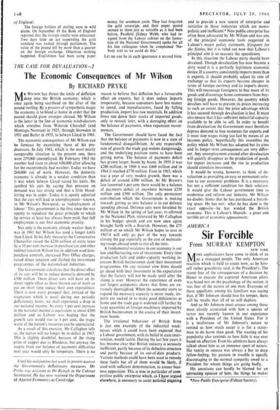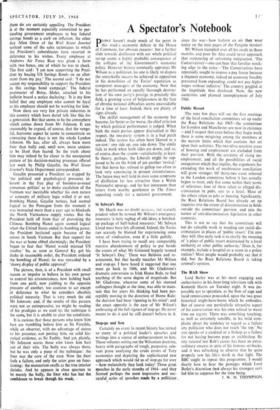Sir Forcible
AMERICA
From MURRAY KEMPTON
NEW YORK
MOST sophisticates have come to think of us as a managed 'people. The only American reaction which is held to count now, as he him- self rather gracelessly said, is the President's. The recent fear of the consequences of a decision by Hanoi to execute the captured American pilots was based not on the psychology of the nation; it was fear of the nature of one man. Everyone of these appellants among his familiars was saying that, if Mr Johnson should lose his temper, there will be results that all of us will deplore.
And so Mr Johnson must arouse among those most closely associated with him a species of terror not recently known in our experience with a President of the United States. For it is a misfortune of Mr Johnson's nature to remind us ,how much easier it is for a states- man to do harm than good. The wasting of his popularity also reminds us how little it was ever based on affection. Even his admirers have always talked about him as an immense sport of nature. His vanity in success was always a bar to deep fellow-feeling; his posture in trouble is equally discouraging to the normal sympathy owed to a President for whom things are going badly.
His associates can hardly be blamed for an untrusting opinion of him; the things he makes *New Public Enterprise (Fabian Society). them do are certainly appalling. The• President is at the moment especially committed to per- suading government employees to buy federal savings bonds as a curb on inflation; the other day Allen Otten of the Wall Street Journal noticed some of the sales techniques to which the President's subordinates have resorted in deference to his wishes. Every employee at Andrews Air Force Base was given a form with two boxes, one of which he was to check. The first said: `I am now supporting the Presi- dent by buying US Savings Bonds on an allot- ment from my pay.' The second said : 'I do not accept my responsibility to support the President in this savings bond campaign.' The federal postmaster of Boise, Idaho, attached to his bulletin board a notice declaring : `It is my firm belief that any employee who cannot be loyal to his employer should not be working for him.'
Now there are very few private industries in this country which have dared talk like this for a generation. But that seems to be the atmosphere which comes down from Mr Johnson. It can reasonably be argued, of course, that the venge- ful, fearsome aspect he seems to concentrate on conveying these days is not the whole Lyndon Johnson. He has, after all, always been more fixer than bully and, until now, more anxious to be liked than feared. So the truth about him may indeed be far closer to the unexpected picture of his decision-making processes offered last week by Philip Geyelin, the Wall Street Journal's State Department correspondent.
Geyelin presented a President so trapped by `the political and psychological pressures in- herent in the free play of business-as-usual consensus politics' as to make escalation of the Vietnam war inevitable whether his own nature or concepts of military logic willed it or not. Bombing Hanoi, Geyelin notices, had seemed logical to the Pentagon from the moment it was instructed more than a year ago to blockade the North Vietnamese supply routes. But the President held off from fear of provoking the Chinese. Bombing Hanoi again seemed logical when the United States ended its bombing pause; the President hesitated again because of the unrest in South Vietnam. But then support for the war at home ebbed alarmingly; the President began to fear that 'Hanoi would misread US resolve.' So, as soon as General Ky got his decks in reasonable order, the President ordered the bombing of Hanoi; he was rewarded by a `showy, display of public approval.'
The picture, then, is of a President with small reason or impulse to believe in his own power to control his circumstances, now holding back from one peril, now yielding to the opposite pressure of another, too cautious to act except in deference to what he considers absolute political necessity. That is very much the old Mr Johnson; and, if the results of this posture were not so unimpressive, we might be reading of his prodigies as we used to; the technique is the same, but it is unable to alter the conditions.
It is curious that those persons who know him best are trembling before him as Sir Forcible, while an observer, with no advantage of access to his presence, can portray him, on solid his- torical evidence, as Sir Feeble. And yet, plainly, Mr Johnson scares those who know him best out of their wits. The bully was always there, but he was only a piece of the technique: the fixer was the core of the man. Now the fixer feels a failure, and only the actor goes on func- tioning: the mannerism swells as the true interior shrinks. And he appears in close quarters to be merely the bully, the fixer who has lost the confidence 'to break though.his mask,































 Previous page
Previous page